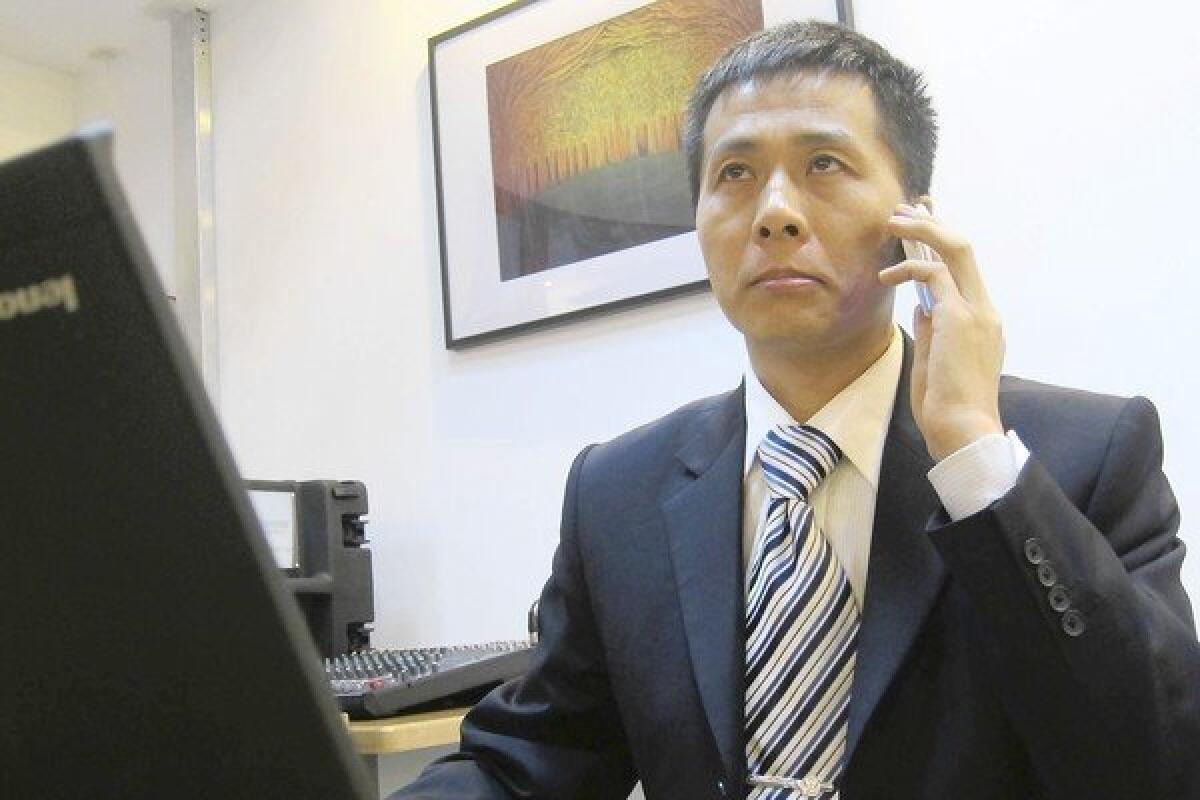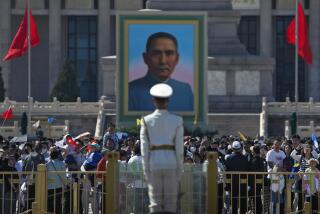China sex video scandal puts website founder in spotlight

BEIJING — Zhu Ruifeng fancies himself a Chinese version of WikiLeaks founder Julian Assange, a citizen journalist who is plying his trade online.
In 2006, he started the People’s Supervision website, which breaks stories about official corruption in China. He has had a couple of scoops — one about the widespread use of expired vaccines and others about crooked party apparatchiks — but nothing that’s gotten the reaction of a sexually explicit 36-second video released last week.
The video shows a paunchy Communist Party official in flagrante delicto with an 18-year-old woman in Chongqing. The woman, who recorded their encounter with a camera hidden in her purse, had been sent by a construction executive who hoped to use it as blackmail to get municipal contracts.
Interviewed at a Beijing bookstore where he was taking cover amid the media storm, Zhu said he was inspired by the recent 18th Communist Party congress, in which outgoing President Hu Jintao and his successor, Xi Jinping, loudly pledged to stamp out corruption.
“They are always repeating the same slogan about anti-corruption, but in the end they only take out their opponents,” said Zhu, a skinny 31-year-old whose dark suit and striped tie made him look more like a salesman than an investigative reporter. “I want to find out whether the new president is really serious about corruption.”
The video, shot in 2007 but covered up for years, has gone viral in China, attracting millions of viewers and thousands of unflattering comments about the physical appearance and sexual performance of the hapless official.
The man, Lei Zhengfu, who initially told Chinese reporters that “the video and the photos are fake, fabricated,” was fired from his post as Communist Party secretary from Chongqing’s Beibei district three days after the video’s release.
The scandal appears to be linked to Bo Xilai, the former Chongqing party secretary whose wife was convicted of killing a British businessman with poison. Bo apparently learned about the video a few years ago and helped Lei cover up the potential scandal, arresting the young woman and the construction executive.
The woman spent 30 days in jail and the construction executive served a year.
“Lei was not punished at all. Bo protected him and even promoted him from district chief to party secretary of his district. He got help from Wang Lijun,” Zhu said, referring to Bo’s former police chief, who briefly fled to a U.S Consulate this year and then blew the whistle on the poisoning case.
Bo, a political rival of Xi, has been accused of receiving bribes and maintaining “improper sexual relations with a number of women.” He is expected to stand trial shortly.
Zhu says the source of the video was a former police officer who was unhappy with the coverup of Lei’s case. He also says he has videos of other officials engaged in sexual acts that he will release as soon as he is able to confirm their authenticity.
Zhu’s exposes have won praise in Chongqing, even though the sprawling metropolis on the Yangtze River finds itself once again in the midst of a titillating scandal.
“In a strictly controlled press environment like China, it’s hard to find out the truth by conventional methods,” said Alan Zhang, a blogger and activist in the city.
Perhaps because the case has implicated Bo, Zhu appears to enjoy some semiofficial support in his anti-corruption crusade. The China Daily praised his work Tuesday in an editorial about online exposes.
“Thanks to its democratic nature and incomparable efficiency and effectiveness in disseminating information, the Internet has become a popular platform where the otherwise voiceless can speak out,” the English-language state-run newspaper said. “Rumors about Lei’s philandering and corruption have been around for years locally, but a probe had not been launched until the sex video was posted online.”
Zhu is only one of a number of online vigilantes monitoring government corruption in China.
One microblog called Anti-Official Cars Extravagance invites people to post photographs of officials driving luxury cars. Another collects photographs from the Internet of officials wearing expensive watches. In September, an official in Shaanxi province who had been photographed wearing a $30,000 watch was discovered by Internet activists and sacked from his job.
More to Read
Sign up for Essential California
The most important California stories and recommendations in your inbox every morning.
You may occasionally receive promotional content from the Los Angeles Times.










